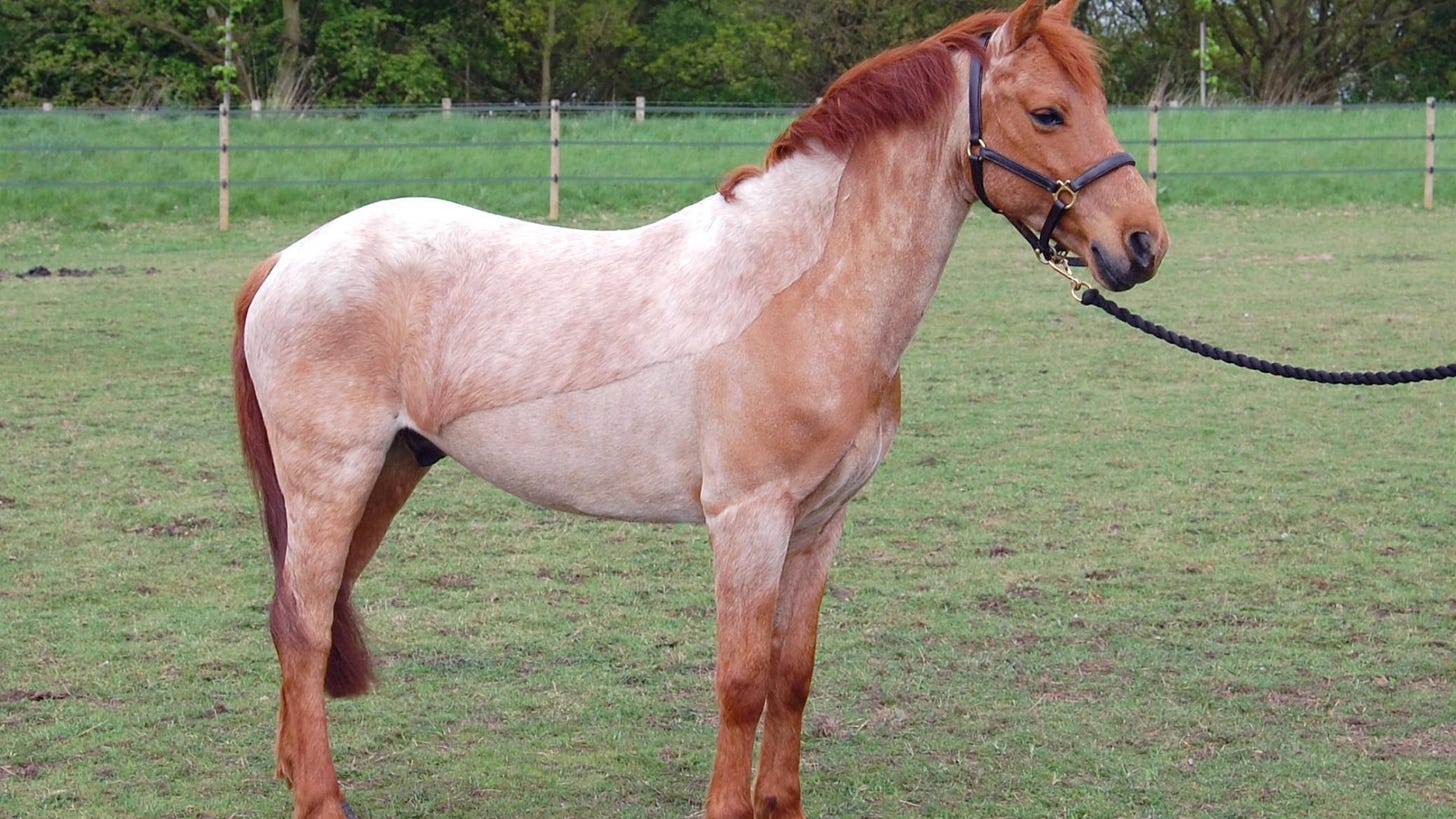“Multiple organ dysfunction syndrome,” the veterinarian said. “There’s nothing we can do. He may last another day or two, but I doubt it.”
Sam Gena walked with Doc Adams to his car. “I gave him a shot of vitamins, but that was for your daughter’s sake. How long has Flo been sitting there with him? She looks exhausted.”
“He went down on Thursday,” Sam said. “She’s been with him day and night since. By the way, Doc, thanks for coming out on your Saturday off.”
“No problem, Sam. Flo won’t have long to wait now,” Doc said as he put his case into the trunk of his Ford.
Sam glanced back at the stable, his hands thrust deeply into his pants pockets. “Red was her birthday present when she turned eight, and she’s won more blue ribbons with that roan than I can count. Raised him from a colt, and he’s been her best friend for the past couple of years,”
“Yeah, it’s easy to get attached to an animal. They become family.”
“Say, Doc. What causes this disease, anyway? I’ve never had any animal get sick like this. Some new virus, you think?”
“No one knows what causes this organ failure in some horses, Sam. It’s not a poison or virus. We just don’t know. Maybe the geniuses will find out someday, but right now, no one knows; it’s not contagious, and there’s no cure.”
“Thanks, Doc.”
Sam watched the dusty Ford pull out of the driveway and disappear on the gravel road toward town. He slowly walked back toward the house, hands in his pockets, eyes on the worn path.
“What did Doc Adams say?” Maggie stood just inside the screen door of the white clapboard farmhouse. “Did he say he could fix Red up?”
“No. There’s nothing he can do. Dying is part of life. Flo is ten now and will have to understand that. She will. She’s tough.”
“Well, I’m going over to fetch Mrs. Curtis. Maybe she has some herbs or something that can help,” Maggie said as she stepped onto the porch.
“She’s a witch, Maggie. She and her herbs. She talks to plants, Honey. You and I heard her talking to those weeds like they were old friends the last time she stopped by.”
“You’re too old to believe in witches, Sam,” Maggie said as she stood with her hands on her hips, watching her husband. “Mrs. Curtis helped that Roscoe boy when the doctors said he was a goner. And, by God, if she can help a boy, she may be able to help a horse.”
“Well,” Sam said, reaching for the screen door handle. “You do what you want; you will anyway.”
Later that afternoon, Sam stood on the front porch with his coffee as Mrs. Curtis exited Maggie’s little car. The stout woman moved slowly, using a cane. She glanced at Sam, exchanged nods, and followed Maggie to the stable.
Ten minutes later, Maggie and Flo came up the path to the house.
“What’s happening down there?” Sam asked. “Red give it up?”
“No,” Maggie paused in front of Sam. “She told me to get some food in Flo, so I’m going to make sandwiches. You want one?”
“You left her alone down there?”
“Yes, I left her alone. You think she’s going to steal a sick horse or what?”
“No, I guess it’s all right. And yes, I’ll take one of whatever you're putting together.”
Flo wolfed down her sandwich, drank a glass of milk, and ran to the stable. Maggie was still clearing the crumbs from the table when she heard Flo scream.
Sam and Maggie got to the stable on a dead run and burst through the double door. It took a moment for their eyes to adjust to the dim interior.
Red was standing in his stall, and Flo had her arms wrapped around his neck, tears pouring down her cheeks.
Mrs. Curtis was smiling. “Now, Flo. Don’t ride him for a day or two. Just walk him around outside until his legs get back their strength.”
“I’ll be damned,” Sam said with a shake of his head. “I will be damned.”
The town hall had chairs for one hundred people, but it was standing room only this evening.
Sheriff Luther Branch sat behind the table on the small stage. “I can’t arrest her for healing people,” he said. “She hasn’t broken any laws that I know of.”
A thin woman in the front row of seats jumped to her feet. “She’s a witch, Sheriff. You know it, and so does everyone here. This is a Christian town with good Christian people. We don’t need any spawn of Satan going around casting spells on our children.”
“What exactly has she done, Mrs. Brown? Other than healing some folks and some farm animals?”
“Here, Sheriff. Look at my Lisa here. She was loaded with pimples until that witch put a spell on her. You can see for yourself there ain’t a pimple left on her face. Only a Child of Satan could do that.”
Lisa was pulled from her chair and pushed to the stage. Her skin glowed with youthful health.
“Yes,” the Sheriff said, “You have a beautiful daughter. I’d think you’d be grateful for whoever cured her acne.”
“She’s grooming my daughter. Using spells to make her a witch’s helper, that’s what, Sheriff. Next, she’ll be teaching her black magic.”
“It’s just the start, Sheriff,” a woman shouted. “This is how the devil gets his hooks into a town.”
“Next, it’ll be sex parties up at that hovel she lives in,” a stout man boomed, sweat glistening on his face. “The kids in town are already saying she’s a nice lady. We know what they really mean.”
“She’s an atheist, Sheriff,” another man shouted. “She could never step into the church in town because she’d be struck dead by the hand of God.”
The meeting lasted a full hour, with over fifty people protesting the evil they saw in the elderly herbalist.
Sheriff Branch finally stood up. “That’s enough. Mrs. Curtis has broken no laws, and I won’t arrest her. If you have a problem with her Christian values, I suggest you take it up with Reverend Tanner, not with me.”
He spread out his arms. “You people go home now and forget this nonsense. Mrs. Curtis is no witch. She’s just a woman who likes to help people with their problems, and if she can heal one or two, that’s for the good. Go on, now. This meeting is adjourned.”
“If you don’t do nothing, Luther,” Mrs. Brown snarled as she passed the Sheriff,” we’ll handle this ourselves.”
The Sheriff waited until the hall was clear before turning to his deputy. “Head up to old lady Curtis and let her know trouble is coming. These “good Christian” people ain’t above burning her at a stake.”
A week later, Mrs. Curtis drove her battered Chevy pickup across the state line. “This is the eighth town I’ve had to leave after people discovered my ‘gift,’” she said to herself. “Eight towns and six states found me too frightening, too threatening. Anything different is ‘bad,’ even if it helps them live better.
“I’m done helping people,” she continued in a whisper. “From now on, I mind my own business and don’t let on that I can heal.”
Although it was breakfast time, the small diner’s parking lot was nearly empty. Mrs. Curtis took a window seat in a booth and scanned the typed menu. The only other customers were two large men who left the restaurant after the cashier rang up their bill.
“What’ll it be, Honey?” the waitress asked.
One of Mrs. Curtis’s habits that spooked people was her piercing gaze, which took in details. She noted that the waitress was as thin as a grass stalk and that her face was a map of worry.
“Coffee, please. And I’ll have the vegetarian omelet.”
“Coming right up.”
A small child was sitting in a stroller near the counter. The waitress stopped and kissed him quickly before passing Mrs. Curtis’s order to the cook.
Mrs. Curtis saw that the toddler was pale, had dark circles around his eyes, and was as thin as the waitress. He barely moved, and his brown eyes lacked sparkle.
The waitress, whose plastic name tag identified her as “Stella,” put a cup of coffee in front of Mrs. Curtis, then sat at the counter next to the stroller and moved it back and forth. She smiled weakly when she saw that Mrs. Curtis was watching the child.
“He’s my boy,” she said. “He was born missing some glands, and the doctor says he has a wasting disease. I bring him to work with me and keep an eye on him. His old man just took off, and Jimmy, here is all I got left.”
Mrs. Curtis closed her eyes and took a deep breath through her nose. “No, no. I will not get involved. I’m done with helping people,” she told herself.
When she opened her eyes, the infant was looking at her. A grimace of pain crossed his face, but he made no sound.
“I give him medicine,” Stella said, “but it don’t seem to help. He’s four years old but looks like a two-year-old. They tell me he won’t grow or fill out.”
“No,” Mrs. Curtis said to herself. “He’ll die.” She took another deep breath.
A bell dinged at the kitchen service window.
“Would you like me to hold him while you get my omelet?”
Stella smiled, picked up the boy, and brought him to Mrs. Curtis. “He’s delicate,” Stella said, “and don’t weigh more than a penny.”
She placed the boy on the seat next to the woman, who wrapped her arm around his thin shoulders. “He’ll be fine here,” Mrs. Curtis said.
A minute later, Stella placed the plate on the table and retrieved her son. His eyes sparkled, and he smiled at his mom as she put him back in his stroller.
Four men entered the restaurant and took a booth. Stella was busy getting them coffee while keeping an eye on her little Jimmy. The boy had climbed out of his stroller and pushed it across the floor, making sounds like a truck engine.
After finishing her breakfast, Mrs. Curtis took her bill to the cashier. The cook exited the kitchen, took the receipt, and rang up the tab.
“Thanks for stopping by, Ma’am,” he said.
While Stella went to grab her son, who was trying to climb onto the counter, Mrs. Curtis quietly slipped out of the door and hurried to her pickup truck.
“Just this once,” she said aloud as she drove out of the parking lot. She smiled broadly. “Ha. Lady, you’re a fool. It’ll always be ‘Just this once.’
Mrs. Curtis soon got a job as a cleaning lady in a small hospital, which amazingly soon showed the highest cure rate of any similar institution in the state.
The title is from Stephen Wright’s novel, Harold, 2024, Simon and Schuster Pub, page 59







Lovely story, Tom.
That was a heartwarming little story. I think I'll re-read it.